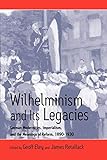Wilhelminism and Its Legacies : German Modernities, Imperialism, and the Meanings of Reform, 1890-1930 / ed. by James Retallack, Geoff Eley.
Material type: TextPublisher: New York ; Oxford : Berghahn Books, [2003]Copyright date: ©2003Description: 1 online resource (280 p.)Content type:
TextPublisher: New York ; Oxford : Berghahn Books, [2003]Copyright date: ©2003Description: 1 online resource (280 p.)Content type: - 9781571816870
- 9780857457110
- 943/.084 23
- DD228 .W55 2008eb
- online - DeGruyter
| Item type | Current library | Call number | URL | Status | Notes | Barcode | |
|---|---|---|---|---|---|---|---|
 eBook
eBook
|
Biblioteca "Angelicum" Pont. Univ. S.Tommaso d'Aquino Nuvola online | online - DeGruyter (Browse shelf(Opens below)) | Online access | Not for loan (Accesso limitato) | Accesso per gli utenti autorizzati / Access for authorized users | (dgr)9780857457110 |
Frontmatter -- Contents -- Foreword -- Acknowledgments -- Introduction -- 1 – Making a Place in the Nation Meanings of “Citizenship” in Wilhelmine Germany -- 2 – Membership, Organization, and Wilhelmine Modernism: Constructing Economic Democracy through Cooperation -- 3 – “Few better farmers in Europe”? Productivity, Change, and Modernization in East-Elbian Agriculture 1870-1913 -- 4 – The Wilhelmine Regime and the Problem of Reform: German Debates about Modern Nation-States -- 5 – Lebensreform: A Middle-Class Antidote to Wilhelminism? -- 6 – Imperialist Socialism of the Chair: Gustav Schmoller and German Weltpolitik, 1897-1905 -- 7 – “Our natural ally” Anglo-German Relations and the Contradictory Agendas of Wilhelmine Socialism, 1897-1900 -- 8 – The “Malet Incident,” October 1895 A Prelude to the Kaiser’s “Krüger Telegram” in the Context of the Anglo-German Imperialist Rivalry -- 9 – Colonial Agitation and the Bismarckian State: The Case of Carl Peters -- 10 – The Law and the Colonial State: Legal Codification versus Practice in a German Colony -- 11 – Max Warburg and German Politics: The Limits of Financial Power in Wilhelmine Germany -- 12 – Continuity and Change in Post-Wilhelmine Germany: From the 1918 Revolution to the Ruhr Crisis -- 13 – A Wilhelmine Legacy? Coudenhove-Kalergi’s Pan-Europe and the Crisis of European Modernity, 1922-1932 -- 14 – Ideas into Politics: Meanings of “Stasis” in Wilhelmine Germany -- Notes on Contributors -- Publications by Hartmut Pogge von Strandmann -- Index
restricted access online access with authorization star
http://purl.org/coar/access_right/c_16ec
What was distinctive—and distinctively "modern"—about German society and politics in the age of Kaiser Wilhelm II? In addressing this question, these essays assemble cutting-edge research by fourteen international scholars. Based on evidence of an explicit and self-confidently "bourgeois" formation in German public culture, the contributors suggest new ways of interpreting its reformist potential and advance alternative readings of German political history before 1914. While proposing a more measured understanding of Wilhelmine Germany's extraordinarily dynamic society, they also grapple with the ambivalent, cross-cutting nature of German "modernities" and reassess their impact on long-term developments running through the Wilhelmine age.
Mode of access: Internet via World Wide Web.
In English.
Description based on online resource; title from PDF title page (publisher's Web site, viewed 25. Jun 2024)


